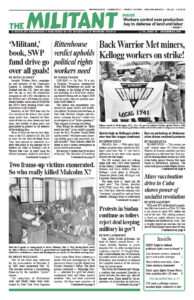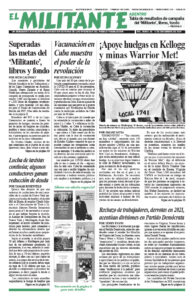With over 80% of the island’s population fully vaccinated as of Nov. 20, Cuba is on course to reach 90% before the end of the year. This striking progress is based on highly effective vaccines developed and produced in Cuba. This is despite stepped-up sanctions that are part of Washington’s more than 60-year long economic war against Cuba’s socialist revolution.
Cuba is the only country in the world that has extended vaccinations to children between the ages of 2 and 5 years old. In Cuba vaccination is voluntary. Their unprecedented success — which makes Cuba one of the top three countries in the world in vaccination rates, way ahead of the U.S. — shows what is possible when working people are convinced the government is theirs, not an enemy, and health care is a right, not a commodity to profit capitalist bosses.
With deaths from COVID now three or less a day — on some days it has been zero — Cuba has begun once again to welcome solidarity brigades and tourists from around the world, with no quarantine; hold broader public events and political activities; and reopen schools and factories.
The Joseph Biden administration has maintained all the economic and financial restrictions imposed by previous administrations, Democratic and Republican alike, and added more. The U.S. embargo “affects every aspect of life in our country,” Olga Lidia Jacobo-Casanueva, director of Cuba’s Center for State Control of Medicines and Medical Devices, told MEDICC Review earlier this year.
Chemicals needed for testing are difficult to procure, she said, as are spare parts and new equipment. Even paper and toner have been “dangerously low,” she said. That’s not a small question for records essential to modern health care. “This gives you an idea of the comprehensiveness” of the U.S. embargo, she said. “Something as simple as paper is hard for Cuba to purchase on the international market.”
Unlike Moderna and Pfizer, none of Cuba’s vaccines need storage at extreme cold temperatures, making them more suitable for rural areas and large parts of the semicolonial world. Cuba has already sent millions of vaccine doses to Venezuela, Nicaragua and Vietnam. With Cuba’s aid, the Iranian government is producing the vaccine there.
Working people’s increased confidence
Young people joined in making millions of daily visits to people’s homes during the peak of the pandemic to make sure everyone who needed medical treatment got it. Many joined volunteer agricultural brigades to alleviate food shortages exacerbated by the embargo. They were deeply impacted by the experience.
Alejandro López Rodríguez, a student at Havana’s CUJAE technology university, volunteered in the fields, in health centers and door to door. “It was a fantastic adventure, which has allowed me to learn about everything and grow as a human being,” he told the campus media.
On Nov. 21, the first Cuban plane since June landed in Argentina, reinitiating weekly air travel between the two countries. Argentina is historically a major source of tourism to Cuba. That same day, thousands across the island took part in a day of volunteer labor, preparing fields for planting and building homes.
Success in beating back COVID made possible the first national Day of Defense since the start of the pandemic. Workplace, campus, farm and neighborhood militias are a central part of Cuba’s revolutionary strategy of the “war of the entire people.” Thousands of volunteers refreshed their military skills while sending a message to Washington that it would pay a huge price if it tried to invade.
The mobilizations of popular support for the revolution and willingness to defend it arms in hands, in the face of hardships imposed by the U.S. imperialist rulers’ economic and political war, are no small factor in preventing Washington from attempting a repeat of its failed April 1961 Bay of Pigs invasion. That’s also why threatened Nov. 15 disruptions against the revolution instigated by Washington fizzled.
Working people and youth in Cuba are proud of what they have accomplished over the last year. At the same time, they’re aware that the worldwide capitalist economic crisis and the tightening of the U.S. embargo guarantee that shortages of essential goods and other challenges will remain.
“There is a lot to do in Cuba, a lot to transform to overcome the challenges of so many external limitations and those of our own doing,” wrote Iroel Sánchez in the Nov. 21 Granma. “But we have good reason to celebrate one more victory against the most powerful empire in history.”

